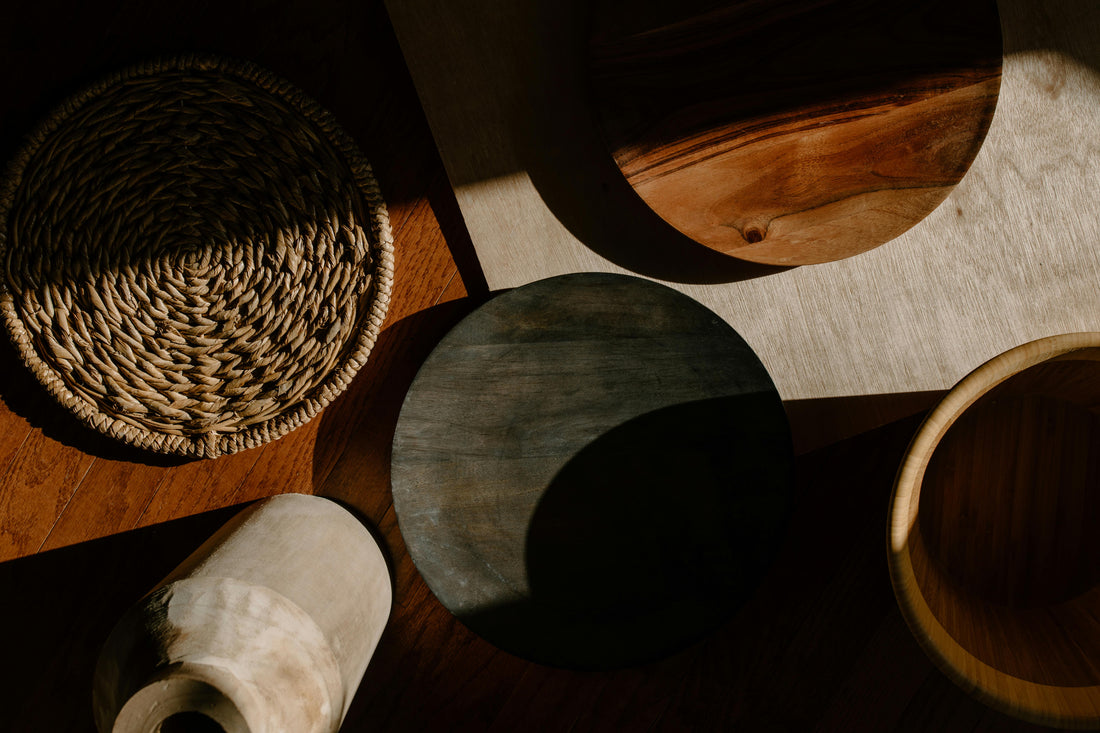
Top Eco-Friendly Kitchenware Trends in 2025 (UK Edition)
What does organic kitchenware look like in 2025? It’s a blend of timeless materials and innovative design. Here are the top sustainable kitchenware trends making waves in UK kitchens this year:
-
Natural Bamboo and Wood Utensils – Renewable and compostable, bamboo kitchen utensils have become a must-have. From spoon sets to cutting boards, bamboo is durable, light, and grows quickly without pesticides. Unlike plastic spatulas, bamboo and hardwood utensils won’t melt or release toxins into hot food. They add a warm, rustic touch to your kitchen and can last for years with proper care. (Our tip: Hand wash and oil your wooden cutting boards and spoons to keep them from cracking or drying out.) For example, our Organic Bamboo Utensil Set is a customer favourite for flipping, stirring and serving in sustainable style.
-
Recycled and Upcycled Materials – Kitchenware made from recycled glass, metal or reclaimed wood is on the rise. Think drinking glasses made from recycled wine bottles, or dining plates crafted from recycled ceramics. According to design professionals, client demand for recycled materials has skyrocketed – 80% of designers report increased interest in recycled/upcycled products, and 95% now include recycled options in projectsasdonline.com. Brands are responding, with about 68% of kitchenware companies now selling products made from recycled resourcesasdonline.com. By choosing items like recycled glass storage jars, you not only reduce waste but also get pieces with unique character and story.
-
Plastic-Free Food Storage Solutions – Ditching plastic containers and clingfilm is a key part of an organic kitchen. Instead, UK shoppers are embracing glass, stainless steel, and organic cloth for food storage. Glass lunch boxes and mason jars are BPA-free and infinitely recyclable. Stainless steel tiffins and containers are lightweight, unbreakable, and can last decades. One of the biggest trends is beeswax food wraps – a natural wrap made from organic cotton infused with beeswax (and often tree resin and jojoba oil). These wraps mold around food or bowls using the warmth of your hands, replacing single-use clingfilm. They’re reusable for months and compostable at end of life. Beeswax wraps have become so popular that you can even find them in local UK supermarkets and zero-waste shops now. Embracing these swaps means far less plastic waste leaving your kitchen each week.

-
Non-Toxic Cookware and Bakeware – Conventional non-stick pans can contain PFAS chemicals, so consumers are moving toward ceramic-coated or cast iron cookware for a toxin-free kitchen. Cast iron, for instance, is enjoying a comeback for its durability and excellent heat retention. Many UK cooks are rediscovering their grandparents’ cast iron pans or investing in quality new ones that, with care, can last generations. (Fun fact: Some experts say “people need to buy cast-iron pans – the older the better,” favoring these over modern flimsy non-stick pansarchitecturaldigest.com.) Similarly, enamelled cast iron (like dutch ovens) and stainless steel pots are prized for being inert and long-lasting. On the bakeware front, silicone mats are replacing single-use parchment paper, and metal or stone bakeware is preferred over Teflon-coated trays. By choosing PFAS-free, organic cookware, you ensure that no harmful coatings chip into your food – and you’ll likely enjoy better performance in the kitchen too.
-
Organic Textiles and Cleaning Tools – Look around your kitchen and you’ll find plenty of fabrics and tools that can be made more sustainable. Organic cotton or linen tea towels, for example, are far better than microfiber cloths (which shed microplastics in the wash). They are compostable at end of life and often sturdier. In the UK, you can find beautiful tea towels made of GOTS-certified organic cotton printed with eco-friendly dyes. Similarly, consider swaps like coconut husk or wooden dish brushes instead of plastic sponges, and plant-based compostable scrubbers (made from loofah or cellulose). These not only work effectively but biodegrade when worn out, closing the loop with zero waste.
To get you started, here are five must-have eco-friendly kitchenware items popular in the UK right now. Integrating these into your home will drastically cut down on waste and give your kitchen a stylish, natural vibe:
- Bamboo Utensil Set – Ditch plastic spoons and spatulas for a high-quality bamboo utensil set. Bamboo is organic, biodegradable, and its smooth finish won’t scratch your cookware. Plus, bamboo utensils look great in a counter-top jar, adding to that farmhouse kitchen charm.architecturaldigest.com
-
Beeswax Food Wraps – These reusable wraps are a game-changer for food storage. Use them to cover bowls, wrap cheese, half fruits, or sandwiches. Each wrap (made from organic cotton coated in beeswax) can be washed and reused for about a year. They keep food fresh just as well as clingfilm – without any plastic waste. For instance, Bee’s Wrap and other UK brands offer assorted sizes in fun patterns.
-
Reusable Glass Jars and Containers – Stock up on mason jars or repurpose jam jars for storing dry goods, leftovers, or even taking overnight oats on the go. Glass jars are infinitely reusable and recyclable. Many sustainable UK kitchens feature open shelves displaying pantry staples (rice, pasta, pulses) in neat glass jars – it’s both practical and Pinterest-worthy. Look for jars with bamboo or metal lids for a fully plastic-free solution.
-
Cast Iron Skillet or Dutch Oven – Upgrade one of your primary pans to cast iron or enamelled cast iron. Brands like Le Creuset (enamelled) or Lodge (classic cast iron) are beloved, but you can also find great second-hand pieces on marketplaces. Cast iron, when seasoned, provides a natural non-stick surface and boosts your iron intake. It moves from stovetop to oven easily and lasts for decades. It’s the definition of “buy it for life” cookware.
-
Organic Cotton Kitchen Linens – Swap out polyester oven gloves, synthetic aprons, and microfiber cloths for those made with organic fibers. Organic cotton aprons and oven mitts are not only healthier (no off-gassing when heated) but often come in beautiful designs. They’re machine-washable and sturdy. Likewise, choose linen or organic cotton dish towels – they are super absorbent and lend a lovely, rustic touch when hung on a rail. Many UK artisans produce hand-printed organic kitchen linens, marrying sustainability with artful design.

Alt: A set of organic bamboo kitchen utensils (spoon, fork, knife) on a bamboo cutting board, illustrating sustainable alternatives to plastic utensils.
Each of these items helps create a zero-waste kitchen routine. By cooking with cast iron, storing in glass, and cleaning with natural materials, you significantly cut down on the disposable plastics and synthetics leaving your home. Over time, you’ll also find that these products perform better and are more durable – an added bonus to their eco-credentials.
